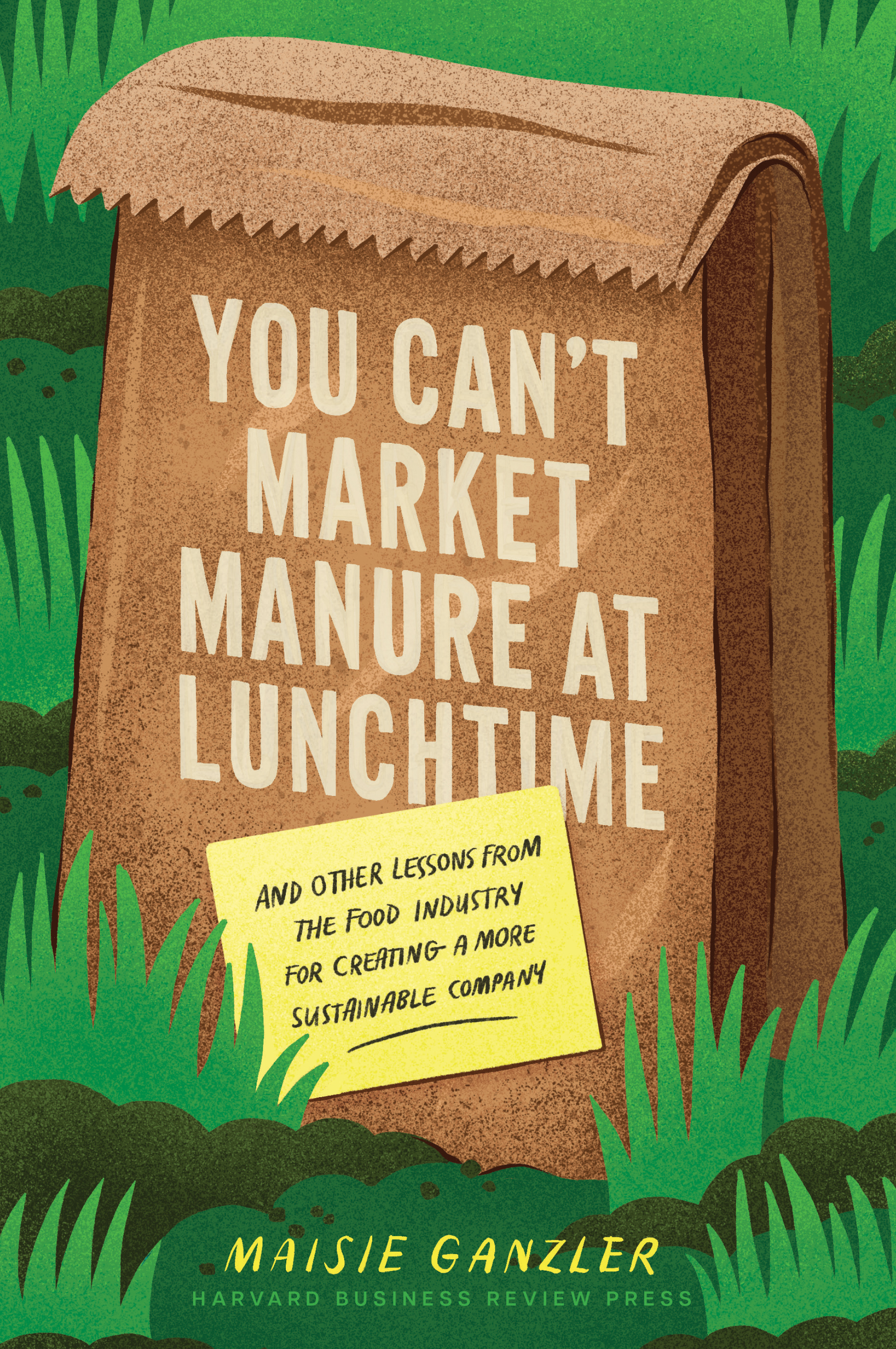Roadmap to Sustainability
6 Min Read By MRM Staff
There is not one simple thing a company can do to be more sustainable–there are dozens that need to done every day, but they are doable. That's one of takeaways in You Can't Market Manure at Lunchtime: And Other Lessons from the Food Industry for Creating a More Sustainable Company by Maisie Ganzler, chief strategy and brand officer of Bon Appétit Management Company. Over the past 30 years, she has been the architect of their groundbreaking approach to responsible purchasing and a leading force behind their pivotal shift toward sustainability.

She dives into the real definition and actions required to achieve sustainability from the environmental to the societal to the economical. Ganzler combines personal experience with interviews from industry insiders including Gary Hirshberg, Cofounder of Stonyfield Organic; Rob Michalak, former Global Director of Social Mission, Ben & Jerry’s; Walter Robb, former Co-CEO of Whole Food Market; Chris Arnold, former Communications Director of Chipotle Mexican Grill, VP and Head of Communication at Darigold.
The book's highlighted advice includes:
Pick The Battles to Win – Ganzler helps companies gather, organize, and evaluate myriad issues they could take on. Pro tip: many will be tempted to do more than they should.
Make Sustainability The Mission (Literally) – Ganzler inspires companies to think through how their overarching goals are supporting or hampering sustainability efforts.
Make Meaningful Environmental and/or Social Change – Ganzler guides companies to find leverage points for making change and setting parameters and targets to measure against, moving sustainability from vague promises to real, operational effectiveness.
Fix It When Falling Short on Impact – Ganzler shows companies how to steer clear of greenwashing, which is focusing on the appearance of being sustainable rather than doing the work of actually operating sustainably.
Tell A Sustainability Story – Ganzler teaches companies how to craft effective messages about complicated scientific topics and spread the word about their efforts, because getting credit matters and is an intrinsic part of building a sustainable business.
To learn more about restaurant sustainability, Modern Restaurant Management (MRM) magazine reached out to Ganzler.
Why did you want to write this book and why now?
I wrote You Can’t Market Manure at Lunchtime to show people how to make meaningful environmental or social change and get market credit for doing so. I thought a step-by-step guide that breaks down the platitude of “doing well by doing good” into actionable steps would spur more effective action toward sustainability.
How did you select business leaders to interview and what stories surprised you the most?
I selected people who’ve created brands I admire and for whom I had a long list of things I wanted to learn about. I figured if I was curious, readers would be too.
I loved each conversation for different reasons. A few of the big surprises for me included how much the Whole Foods Market executive team had struggled to form a stance on GMOs and that the iconic short film “Back to the Start” by Chipotle featuring Willie Nelson only cost them $400,000. That’s much more money than I ever had to spend on marketing but a drop in the bucket compared to what other fast casual brands spend for much less impactful results.
What was your thought process behind the provocative title?
I wanted to set the expectation right away that this isn’t your typical business book full of lofty management theory. These five lessons from the trenches, or manure pits.
I hope the title captures the dual goals of the book. The manure lagoons represent the need for environmental change and marketing speaks to the fact that we’re in business for profit.
I hope the title captures the dual goals of the book. The manure lagoons represent the need for environmental change and marketing speaks to the fact that we’re in business for profit.
What do you see as key challenges for restaurants to adopt more sustainable practices?
Chefs and restaurateurs are extremely resource constrained with the first shortage being that of time. The biggest challenge is simply having the capacity to think about these issues, make a strategic plan, gather information, and take action. Once sustainability rises to the top of the to-do list, the next hurdle is lack of information about the sources of the food they are buying and the practices used to produce it. People often assume cost is the key challenge but even those with tight budgets can be more sustainable. Actions like waste reduction are actually cost savers.
What is the best approach to create sustainability evangelists in the restaurant and foodservice industry?
People become evangelical when they have a transformative experience. Get your cooks, corporate buyers, or C-suite out into the lettuce fields, onto a hog farm, or on a fishing vessel. When they meet the people growing and harvesting our food, taste a just-picked berry still warm from the sun, and see chickens bathing in the dust, they’ll become fervent believers.

What are some things a restaurant operator can put into daily practice to be more sustainable?
Restaurant operators can think of sustainability in three phases: sourcing, operations, and disposal. When sourcing, they can use their purchasing power to support producers who are good stewards of the land and treat their workers and animals humanely. Ask lots of questions, look for certifications such as Certified Humane, the Equitable Food Initiative, and the Fair Food Program and ratings like Seafood Watch. In day to day operations, be mindful about energy and water use. For example, if you use frozen meat, plan ahead so you can slack in the refrigerator rather than having to run potable water over a brick of ground beef for hours.
Restaurant operators can think of sustainability in three phases: sourcing, operations, and disposal.
Lastly, reduce waste by cross utilization of ingredients and cooking a la minute. Prepped vegetables that don’t get used in today’s grilled vegetable sandwich can become tomorrow’s soup. Tomatoes chopped for a salad today can be made into a sauce tomorrow.
Before the pandemic, it seemed that chefs and guests were both very interested in sustainability. We saw sea change over straws and people expressed concern over takeout packaging, but when the pandemic hit, priorities shifted. How much of a focus is sustainability for restaurateurs and guests now?
The pandemic caused us all to take many steps backwards on the road to sustainability. Supply chains were disrupted and seemingly everything was forced into plastic. The crisis highlighted the fragility of our food system and the interdependence we all share. Our underlying values didn’t change though. In some ways it reinforced the need for local food systems, knowing your producer, and caring about those who harvest, cook and serve our food.
Companies who had an authentic commitment to sustainability have returned to their pre-pandemic efforts towards sustainability and conscious customers can sniff out those who haven’t. A February 2022 survey of 16,000 global consumers by the IBM Institute for Business Value revealed that 51 percent of respondents said environmental sustainability is more important to them today than it was just twelve months earlier.
Where do you hope the conversation about sustainability will be 10 years from now? How do you define a sustainable future for restaurants and how important is storytelling to engage with guests?
Ten years from now I hope we’re celebrating the success of all the companies who have made net-zero commitments and signed onto the US Food Loss and Waste Reduction Goal. With those achievements behind us, I hope we’re talking about a food system that restores rather than just doesn’t do damage; about employment practices that help workers upskill rather than just doesn’t exploit them; about animals exhibiting their natural behaviors rather than just arguing they should be allowed to turn around.
This vision is going to take time, attention, and money. In order to allocate those resources, restaurants will need to see business benefits above and beyond the intrinsic satisfaction of doing what’s right. For that, storytelling is critical. Guests need to know the lengths their favorite chefs are going to, or not going to, in order to make dining decisions that align with their values. And I don’t see the coming generations turning away from values-driven purchasing. Three-quarters of GenZ shoppers prefer to buy sustainably rather than to go for brand names according to respondents in a survey of US consumer attitudes on sustainable shopping by First Insight and the Baker Retailing Center at the Wharton School of the University of Pennsylvania. They want to know your restaurant’s story.

